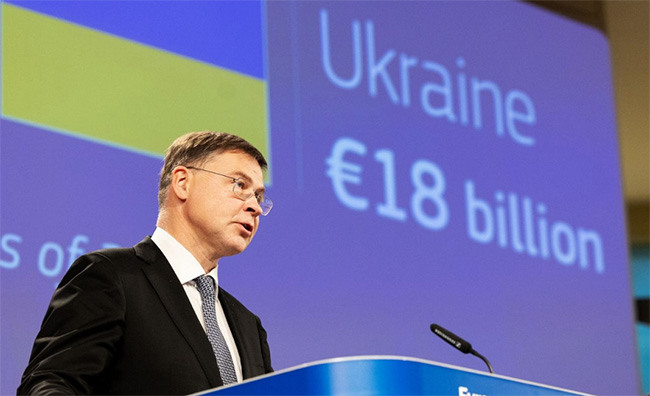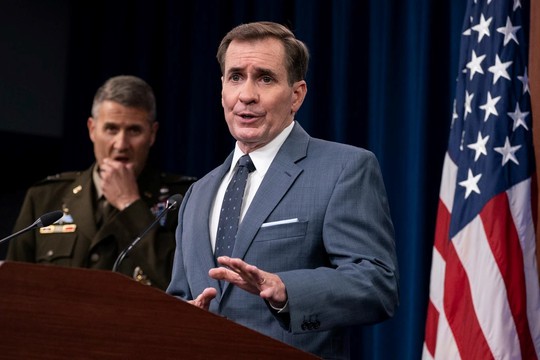Photo: AP
The United States will find it “really” difficult to continue supplying Kiev with weapons for its conflict with Russia if Congress does not provide new funds for the administration by the end of the year, White House National Security Council spokesperson John Kirby said.
In the beginning of November, White House National Security Council spokesperson John Kirby revealed that the US had gone through 96% of funds allocated for Ukraine.
“We think we've got till about the end of the year before it gets really, really hard to continue to support Ukraine, and the end of the year is coming soon” Kirby said during a press briefing.
Kirby reiterated the White House's call for Congress to approve its supplemental funding request, especially ahead of the winter months, which can become critical for Kyiv.
In October, the White House announced that the funds approved by Congress for further military assistance to Ukraine were almost exhausted, forcing it to continuously reduce the volume of aid packages for Kyiv. Biden submitted a $106 billion supplemental request to Congress that includes $61 billion for Ukraine along with aid for Israel.
Earlier in November, the US House of Representatives passed a $14 billion Israel aid bill, separating the assistance from the broader request from the Biden administration for funds for Ukraine, Taiwan and border security. Biden and Senate Majority Leader Chuck Schumer rejected the proposal, instead favoring a combined funding package.

Senators are struggling to strike a long-elusive compromise on US-Mexico border policy that Republicans insist is needed for assistance to Ukraine to pass Congress, writes Bloomberg.
Hardliners in the House gambled that they could leverage the assistance Ukraine says it desperately needs — as well as win a long-sought shift in US politics on immigration — to force Democrats’ hand on asylum restrictions and other Republican border priorities.
But frustrated senators, who met privately throughout the week, left Washington Thursday with no deal on immigration in sight and President Joe Biden’s $61 billion request for Ukraine hanging in the balance.
The White House, in turn, is trying to manage unprecedented levels of frustration and public criticism from some Democratic mayors and other local leaders.
The languishing talks mean a Senate vote on Ukraine funding wouldn’t happen until the week of Dec. 11, at the earliest. The Senate plans to leave for the Christmas holiday on Dec. 15.
The ultra-conservative House Freedom Caucus advocates linking Ukraine funding to border policy, long-term.
The group wants the release of funds to Ukraine to be tied to specific reductions in migration. One proposal would release $5 billion in aid for every 20,000 drop in migration, an idea rejected on its face by Democrats.
 Valdis Dombrovskis, a Latvian politician serving as Executive Vice President of the European Commission, convinces to give European money to Kyiv.
Valdis Dombrovskis, a Latvian politician serving as Executive Vice President of the European Commission, convinces to give European money to Kyiv.
Political wrangling in Germany is preventing the EU getting a deal on a funding top-up, according to the bloc’s budget commissioner.
“The biggest problem is that Germany is so distracted by domestic issues that they literally don’t find time to deal with this,” Johannes Hahn told reporters in Brussels.
Germany is leading a coalition of countries, mainly in the north and east of Europe, that want the European Commission to finance its new priorities by saving cash from other areas of its current budget, which was agreed in 2021. Berlin hardened its position after a recent shock constitutional court verdict blew a €60 billion hole in the country’s budget.
Governments rejected the Commission’s request in June for an extra €66 billion to cover unexpected spending, and they called on the EU executive to trim the headline figure by at least 20 percent, or around €13 billion. The issue is due to come to a head at a summit of leaders later this month.
He dismissed calls from northern countries to redeploy existing funds to finance new priorities as a “good slogan” that is difficult to achieve in practice, as the EU budget is already short on cash.
The extra EU funding would finance continued support for Kyiv (€17 billion in grants, plus €33 billion in non-budget low-interest loans).
Member countries except for Hungary support extra aid for Ukraine. But Budapest threatened to veto the package unless EU leaders agree to review their entire strategy of support for Kyiv.
Unless countries strike a deal to continue funneling aid to Ukraine, the country risks going bankrupt. Finance Minister Serhiy Marchenko said in early November that Kyiv will need help from the start of 2024 to fill an estimated $29 billion budget shortfall.
read more in our Telegram-channel https://t.me/The_International_Affairs

 10:27 04.12.2023 •
10:27 04.12.2023 •























